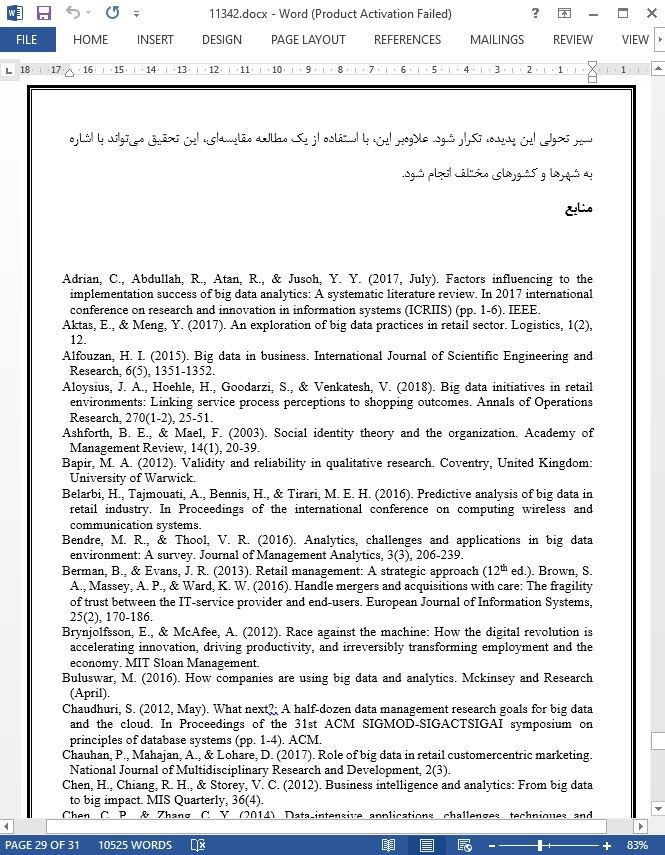
مدیریت داده های بزرگ در صنعت خرده فروشی سنگاپور
چکیده
تحقیقات در زمینه تحلیل دادههای بزرگ عمدتاً بر روی توسعه تکنیکی یا سیستمی متمرکز بوده است که از این بین تحقیقات در مورد استفاده از تحلیل دادههای بزرگ برای درک روابط مشتری و تجربه، بیشتر از سایر موارد انجام شده است. هنوز هم، خلأ پژوهشی در صنعت خردهفروشی با تمرکز بر مدیریت دادههای بزرگ، بررسی تأثیر آن بر رضایت مشتری و عملکرد سازمانی در این بخش وجود دارد. خردهفروشان برای بدست آوردن تصویری یکپارچه از مشتریان و فعالیتهایشان در فروشگاهها یا کانالهای آنلاین تحلیلهایی را انجام میدهند و تصمیمات استراتژیکی در جهت رشد صنعت خردهفروشی میگیرند. از این رو، این مطالعه با تمرکز عمده بر صنعت خردهفروشی سنگاپور برای روشن شدن امکان تحلیل مدیریت دادههای بزرگ صورت گرفته است. روش تحقیق کمی نیز با استفاده از 500 شرکتکننده در صنعت خردهفروشی سنگاپور انجام گردید. نتایج مطالعه نشان داد که در میان تحلیلهای مختلف دادههای بزرگ مورد استفاده در صنعت خردهفروشی سنگاپور، تحلیلهای رسانههای اجتماعی به طور عمده توسط شرکتکنندگان پاسخ داده شده است. محققان بعدی میتوانند روند آینده خردهفروشی در سنگاپور و چگونگی اثرات تغییر تحلیل دادههای بزرگ در چند سال گذشته و مقابله با رکود اقتصادی غیر منتظره آینده این صنعت در سنگاپور را مورد مطالعه قرار دهند.
1. مقدمه
سازمانهای متعددی با حفظ مجموعه بزرگی از دادهها و ساختار دادههای غیر سنتی مرتبط درگیر هستند. اگرچه فاکتورهای مختلفی برای گسترش مهارتهای مدیریت دادههای سازمانی و افزایش سبدمالی از نظر نرمافزارهای مدیریت داده نیز برای مدیریت دادههای بزرگ اجرا میشود. چنین اقداماتی به افزایش خودکار عملکردهای سازمانی کمک کرده و خروجی چنین فرآیندهایی مدیریت دادههای بزرگ (BDM) میباشد. دادههای بزرگ بایستی بهطور دائم در سیستم مدیریت دادههای سازمانها قرار گیرند (Russom, 2011). قابلیت دسترسی، تجزیه و تحلیل و مدیریت حجم بزرگی از دادهها علاوهبر پیشرفت سریع معماری اطلاعات، برای خردهفروشانی که هدفشان بهبود کسبو کار و عملکردشان میباشد، اهمیت زیادی دارد. اگرچه رمز موفقیت در این امر، تجربه مناسب مشتری، بازده عملیاتی، وفاداری و حفظ مشتری میباشد، پیشبینی تقاضا برای مدیریت ماهرانه موجودی کالا، وجه نقد و سودآوری کلی اهمیت زیادی دارد. با توجه به آنکه خردهفروشان در بازارهای مختلفی فعالیت دارند، نوع دادهای که معمولاً مدیریت میشود پیچیدهتر میگردد. با این حال، تجزیه و تحلیل این دادههای پیچیده منجر به درک جامعی از مسیر محصول به سودآوری میشود (Ernst & Young, 2014).
5. نتایج
تأثیر دادههای بزرگ بر عملکرد سازمان مطابق نتایج این مطالعه شامل افزایش بیشتر فروش و کاهش هزینه میباشد، اما بیشتر پاسخها به نفع فروش بیشتر بوده است. در صورت تأثیر بر خدمات مشتری، رضایت بالای مشتریان مشاهده شد. این مورد در مطالعات پیشین نیز مورد تأکید قرار گرفته بود؛ زیرا نتایج یکسانی را در این زمینه نشان میدادند. این مطالعه عمدتاً بر استراتژی در دو راهی قرار گرفتن به عنوان رویکرد اصلی در مدیریت دادههای بزرگ و الگوی VLDB به عنوان روششناسی اصلی تأکید دارد. از نظر کاهش موانع در زمینه مدیریت دادههای بزرگ، استخدام منابع انسانی ماهر در تجزیه و تحلیلهای مختلف بوسیله بیشتر شرکتکنندگان انتخاب شده بود. علاوهبر این، برای بستر قابلیتهای احتمالی بر بازاریابی سفارشی یا سفارشیسازی انبوه تأکید گردید.
Abstract
Much of the research on big data analytics has been centered on technical or system development. Research has been carried out on the usage of big data analytics to understand customer relationships and experience, amongst others. Still, there is a lack of research in the retail industry considering big data management, examining the impact on customer satisfaction and organizational performance in the retail sector. Retailers explore analytics to gain a unified picture of their customers and operations across the store or online channels and make strategic decisions contributing to the growth of the retail industry. Thereof, this study has been conducted by majorly focusing on the Singapore retail industry to clarify the feasibility of big data management analytics. Quantitative research method was employed involving 500 participants from the retail industry of Singapore. The results of the study stated that amongst the different big data analytics utilized within the retail industry of Singapore, social media analytics had been majorly answered by the participants. Future researchers can study about the upcoming retail trends in Singapore and how the effects of big data analysis changed in the past few years and deal with the unexpected future recessions in the retail industry within Singapore.
1. Introduction
Several organizations suffer to maintain large sets of data and the related nontraditional data structures. Different factors of expanding data management skills of an organization and enhancing the portfolios in terms of data management software are also implemented for big data management. Such measures help in increasingly automating the operations of the organization, and the outcome of such processes is the big data management (BDM). The big data should be permanently placed within the data management system of organizations (Russom, 2011). The ability to access, analyze, and manage enormous data volumes besides the fast evolution of information architecture is increasingly critical for retailers who intend to improve business and performance efficiency. Although the key to success is suitable customer experience, operational efficiency, loyalty, and customer retention, the demand of anticipation is significant for the proficient management of inventory, cash, and overall profitability. While retailers grow and extend in the diverse market, the data type that is commonly managed has become more complex. However, the analysis of such complex data leads to a comprehensive understanding of the product’s path to profitability (Ernst and Young, 2014).
5. Conclusions
The impact of big data on the organization’s performance involves an increase in higher sales, as per the results of the conducted study. The reduced cost had also been indicated, but more responses had been in favor of a higher number of sales. In the case of the impact on customer service, highly satisfied customers had been observed. This had been further supported by the literature studies, as different studies had also depicted the same results in this context. The study had further described “Fork in the Road” strategy as an essential approach utilized for managing big data and VLDB paradigm as the main methodology to be used. In terms of reducing barriers within the aspect of big data management, the course of hiring skilled resources within various analytics had been selected by most of the participants. In addition, for the platform of possible competencies, mass customization or customization marketing had been depicted.
چکیده
1. مقدمه
2. پیشینه تحقیق
1-2. دادههای بزرگ
2-2. مدیریت دادههای بزرگ در زمینه صنعت خردهفروشی
3-2. استراتژیها (تکنولوژی محور)، رویکردها و روشهای مدیریت دادههای بزرگ در زمینه صنعت خرده فروشی
4-2. قابلیتهای احتمالی صنعت خرده فروشی در تمرین مدیریت داده های بزرگ
5-2. تأثیر مدیریت دادههای بزرگ بر عملکرد سازمانی و رضایت مشتریان
3. روششناسی
1-3. فلسفه تحقیق
2-3. طرح تحقیق
3-3. روشها و ابزارهای جمعآوری داده
4-3. جمعیت و نمونهگیری
5-3. روش تحلیل دادهها
4. یافتهها و بحث
1-4. آمار توصیفی
2-4. آنالیز سوالهای تحقیق
5. نتایج
Abstract
1. Introduction
2. Literature review
2.1. Big data
2.2. Big data management in the context of retail industry
2.3. Strategies (technology-oriented), approaches, and methods for managing big data in the retail industry
2.4. Possible Competencies for Retail Industry in Practicing Big Data Management
2.5. Big data impact on organizational performance and customer satisfaction
3. Research design and methodology
3.1. Research philosophy
3.2. Research design
3.3. Method and tools of data collection
3.4. Population and sampling
3.5. Method of data analysis
4. Findings and discussion
4.1. Descriptive statistics
4.2. Analysis of research questions
5. Conclusions
- اصل مقاله انگلیسی با فرمت ورد (word) با قابلیت ویرایش
- ترجمه فارسی مقاله با فرمت ورد (word) با قابلیت ویرایش، بدون آرم سایت ای ترجمه
- ترجمه فارسی مقاله با فرمت pdf، بدون آرم سایت ای ترجمه



